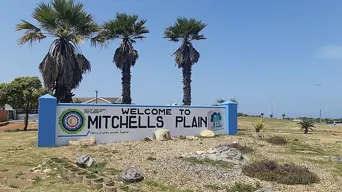ANTHONY HAZELL | Cape Town is actively unstitching apartheid’s spatial legacy
Guest contributor
31 October 2025 | 10:43"Finally, if truth be plainly told, it is the state’s own ‘RDP’ housing programme that actively reinforces spatial apartheid by pushing for large housing projects on open tracts of land far from jobs, amenities and transport."

A sign at the entrance of Mitchells Plain, Cape Town / Wikimedia Commons: Discott
It is important to note that comments incorrectly attributed to Mayor Geordin Hill-Lewis in a recent opinion piece, are based on a misreading of the mayor’s answer to an interview question, which is available for anyone to see for themselves here.
In response to a question about the false framing by certain individuals and groups who claim that current City of Cape Town policies advance spatial apartheid, the mayor responded that this claim is “propaganda language no longer rooted in reality”.
The comment was therefore disputing false claims about the intent of current City policy, and not about the legacy of the past, which persists today and which the City is actively working to unstitch.
This is clear from the evidence the mayor put forward in the interview to demonstrate that the City of Cape Town is going to great lengths to actively counter apartheid’s legacy – citing 12,000 units worth of properties released to the market for affordable housing, for example.
The suggestion that Cape Town is still now acting to perpetuate spatial apartheid, is a well-worn favourite attack line of political hacks and their fellow travellers. That line of attack is pure propaganda, with no basis in reality.
In reality, the current City administration has released more land in the last three years for social housing than in the ten years prior to that combined. The City has also just passed the most significant planning reform in Cape Town since 2015, facilitating the crowding in of private capital for the funding of many more affordable rental flats than the state can ever deliver.
In time this will be seen as one of the most important positive moves for getting people out of shacks and into more formal accommodation in Cape Town, ever.
In reality, Cape Town is doing further pioneering work in social housing by:
- publishing clear discount criteria for discounting our public land parcels to encourage more affordable housing;
- enabling permanent discounts for lights and water charges for social housing developments to help with affordability;
- and setting aside R20m a year to help fund bulk service connection charges for social housing projects.
All of the above are firsts in South Africa, as many of the more sensible and non-partisan housing organisations have noted.
As is now well-known, 75% of Cape Town’s infrastructure investments over its three-year budget timeframe will directly benefit lower-income residents. Just the pro-poor portion of Cape Town’s SA-record infrastructure investments is larger than the total capital budget of any other city, by some distance.
Besides accelerating land release, Cape Town is home to SA’s biggest public transport project for any city: the MyCiti South-East Corridor expansion. This major new route will significantly reduce the time and cost to travel from Khayelitsha, Mitchells Plain and other communities across the Metro South East to the economic nodes of Claremont, Wynberg and the broader southern suburbs. This will be a transformative project for increasing the connectivity and accessibility of the city’ lower-income neighbourhoods.
Finally, if truth be plainly told, it is the state’s own ‘RDP’ housing programme that actively reinforces spatial apartheid by pushing for large housing projects on open tracts of land far from jobs, amenities and transport.
By all means, let’s have a debate about policy options and the pace of change; but let’s do so on the basis of the facts, and not by building straw men to tear down through the false attribution of statements never made.
Anthony Hazell is a policy advisor to Mayor Geordin Hill-Lewis.
Get the whole picture 💡
Take a look at the topic timeline for all related articles.













